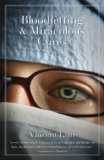Summary | Excerpt | Reading Guide | Reviews | Beyond the Book | Readalikes | Genres & Themes | Author Bio

Critics' Opinion:
Readers' Opinion:
First Published:
Sep 2007, 362 pages
Paperback:
Sep 2008, 362 pages
 Book Reviewed by:
Book Reviewed by:
BookBrowse Review Team
Buy This Book
“I can’t find marks, but you understand this stuff.
You’re losing marks on detail. The Krebs cycle—you
know it better than I do. The problem is the way you
study and write.” She said this not only to be kind, but
because she found his answers elegant and insightful.
Ming’s own responses were always factually complete
in point form, convenient to check off for a perfect
score. Fitzgerald seemed to disregard the assigned
value of questions, and in some three-inch spaces he
cramped his writing into tiny letters in order to include
the essay-length breadth he felt was appropriate. In
another section where a page was allotted, he wrote
four lines and drew a diagram that, to him, encapsulated
the entire issue.
It was Ming’s cousin Karl who had taught her the rules
of academic success: be meticulous about details
because it’s easier to lose two marks than to earn eight,
understand what will be asked and prepare to deliver it,
expect that the next test will be harder and that this is
your reward for success. When Karl was eighteen and
Ming was twelve, it was as a big favor to her father that
her uncle had agreed to allow Karl to use some of his
valuable time to tutor the B student, Ming. Karl was the
shining boy who filled her uncle’s mantelpiece with
academic trophies. He was on scholarship in his first
year of university biology while Ming blundered
through junior high.
Ming’s father impressed upon her the importance of
learning from her cousin, of not bringing shame to her
parents. She admired Karl’s easy confidence and the
way he grasped everything he wanted—each award,
each prize. He taught her a system—a way of breaking
knowledge into manageable packages that might be
related but didn’t have to be, that didn’t even have to
matter, but the facts of which must be internalized,
mastered, and displayed without so much as a momentary
lack of confidence. To lose sight of any of these
lists, subjects, or compartments would be to fail, and if
you failed any part—whatever else had been learned
would not matter when the time came to see if you
would be allowed to write the next, tougher test.
“Well, congratulations, Doctor Ming,” said Fitzgerald,
his grin too wide. She knew he genuinely intended it,
but that it was hard to smile through his frustration.
“That’s a bit premature,” she said. She rolled his biochemistry
final into a tube in her hand and said, “How
was your Plato?” This was his humanities elective, and
she did not take the same course so there could be no
comparison.
“Top of the class,” he said.
“Wonderful.”
“In the philosophy department, that’s a seventy-one.”
“You need to strategize your electives,” she said.
Hers was introductory psychology, a course that fulfilled
its reputation of providing an easy A+.
“Next year,” he said. Each year, a few were admitted
to medicine. Some rejected applicants decided that they
had other things to do with their lives, and the remaining
aspirants continued to fill out application packages
and resubmit them. “I’ll be more strategic next year.”
“If you don’t get in, no one deserves to get in. This
grade point business is a stupid, arbitrary system,” she
said, profoundly believing this as someone who had
completely mastered it.
“I’ll be happy when you get in,” he said. “Really,
truly. Lots of people say that, but I really will be
pleased for you.”
“Thank you,” she said. Ming believed that he would
be happy for her, though many would say so and it
would be fake. She wanted to tell him about how she
tried to save seats for him in the lectures without wanting
him to see that she was doing so, about how she
liked seeing him ride his bicycle around campus in the
snow—pants tucked into his socks—and about how
certain things scared her just enough that she couldn’t
indulge her present impulse to lean toward him.
The above excerpt is the complete text of the short story "How To Get Into Medical School, Part 1" , pages 1-30 of Bloodletting & Miraculous Cures. Copyright (c) Dr. Vincent Lam, 2007. Reproduced with permission of the publisher. All rights reserved.





The Flower Sisters
by Michelle Collins Anderson
From the new Fannie Flagg of the Ozarks, a richly-woven story of family, forgiveness, and reinvention.

The House on Biscayne Bay
by Chanel Cleeton
As death stalks a gothic mansion in Miami, the lives of two women intertwine as the past and present collide.

The Funeral Cryer by Wenyan Lu
Debut novelist Wenyan Lu brings us this witty yet profound story about one woman's midlife reawakening in contemporary rural China.
Your guide toexceptional books
BookBrowse seeks out and recommends the best in contemporary fiction and nonfiction—books that not only engage and entertain but also deepen our understanding of ourselves and the world around us.